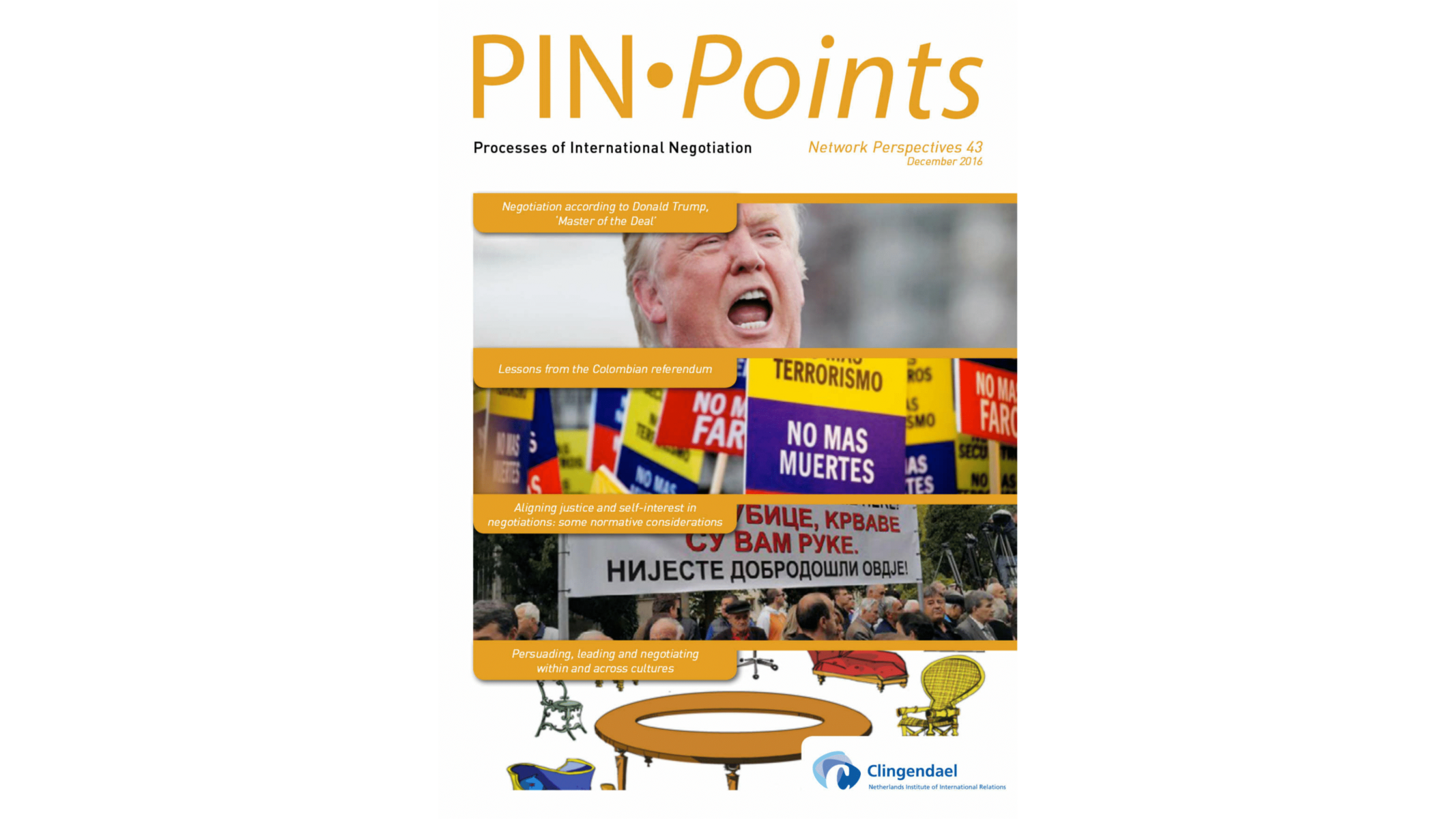
PINPoints 43
In this issue, e.g., Zartman on the negotiation style of President-elect Donald Trump; Faure & Anstey on Brexit negotiations; Zartman, Rosoux & Anstey, and Oliver & Gawn (Strategem) on the Colombian peace agreement referendum, and Schüssler on self-interest and justice.

Contents
4. Negotiation according to Donald Trump, 'Master of the Deal' (I. William Zartman)
6. Op-ed: Brexit (Mark Anstey & Guy Olivier Faure)
8. Colombian referendum: "Uribe turned a personal vendetta into a national catastrophe" (I. William Zartman)
9. Colombian referendum: "The deal was not about forgiveness, but about moving forward" (Valerie Rosoux & Mark Anstey)
11. Colombian referendum: "The voters answered the wrong question" (Quintin Oliver & Ryan Gawn)
13. Negotiating friendship: Franco-German and Franco-Algerian cases (Valerie Rosoux)
20. Multilateral negotiations revisited: The Hague Peace Conferences (Paul Meerts)
23. Aligning justice and self-interest in negotiations: some normative considerations (Rudolf Schüssler)
27. Persuading, leading and negotiating within and across cultures (Mark Anstey)
38. Closure: how negotiations end (I. William Zartman)
47. "Hopeful ambiguity" in negotiation closure (Mikhail Troitskiy)
51. PIN remembers its godfather, Howard Raiffa [1924-2016] (I. William Zartman)
Blogposts on separate articles:
Negotiation according to Donald Trump, 'Master of the Deal' (I. William Zartman)
Criticism on the secretive processes and on the results of international negotiations played an important role in getting Donald Trump elected. He promised to ‘drain the swamp’ in Washington and, more importantly, claimed to represent the interests of blue-collar workers. Looking back with hindsight it is indeed possible to say that the interests of this specific group have been underrepresented in the mandates of negotiators working for successive American presidents on trade deals (e.g., NAFTA and TPP). President Trump aims to include these voices while (re)negotiating trade agreements and make the ‘best deals for America’, or at least for the people who voted him into office. I. William Zartman describes the expected negotiation style of President Trump in the opening article of PINPoints 43:
Op-ed: Brexit (Mark Anstey & Guy Olivier Faure)
On the campaign trail Trump called his prospective election ‘Brexit plus plus’. Indeed, from a negotiations perspective there are quite some similarities. It is possible to argue that Brexit is also the result of a badly managed constituency who felt underrepresented in many EU negotiations in which the UK participated. Many ‘leave’ voters preferred a sense of renewed control over their destiny to the EU’s murky decision-making procedures. Ironically, the destiny of the UK largely depends on future negotiations, since it has to negotiate with the EU on its exit terms. If prime minister May chooses a so-called ‘soft exit’ – keeping the UK in the internal market of the EU – much of the wanted independence and control will be an illusion. The UK would still have to implement many EU rules and regulations, but without their negotiation chair in Brussels. Mark Anstey and Guy Olivier Faure reflect:
Dossier: the referendum on the Colombian peace agreement (Zartman, Rosoux & Anstey, and Oliver & Gawn)
A more direct example of a constituency turning against a negotiation result is the referendum in Colombia. Three articles (by Zartman, Rosoux & Anstey, and Oliver & Gawn) suggest that the peace deal between the Colombian president and FARC was good, but that it got lost in national politics. For now the willingness to reach a final agreement has been strong and the parties have not fallen back to violence. Just before publishing this issue a renewed agreement was announced. Let’s hope that this time the deal will be ratified and the really hard work – implementation – can begin.
Colombian referendum: "Uribe turned a personal vendetta into a national catastrophe" (I. William Zartman)
Questions and answers with I. William Zartman on the outcome of the Colombian referendum.
Colombian referendum: "The deal was not about forgiveness, but about moving forward" (Valerie Rosoux & Mark Anstey)
Questions and answers with Valerie Rosoux & Mark Anstey on peace, reconciliation and the Colombian referendum.
Colombian referendum: "The voters answered the wrong question" (Quentin Oliver & Ryan Gawn)
Questions and answers with Quintin Oliver & Ryan Gawn, the founding directors of Stratagem International who have worked on the YES campaign for the referendum on the peace agreement in Colombia.
Negotiating friendship: Franco-German and Franco-Algerian cases (Valerie Rosoux)
Valerie Rosoux compares the failed Treaty of Friendship between France and Algeria with the successful Elysée Treaty between France and Germany. Why was closure impossible in one case and not in the other?
Multilateral negotiations revisited: The Hague Peace Conferences (Paul Meerts)
Paul Meerts looks back at the historic The Hague Peace Conferences (1899 and 1907). These were two of the first diplomatic negotiation processes in which public opinion played an important role.
Aligning justice and self-interest in negotiations: some normative considerations (Rudolf Schüssler)
Rudolf Schüssler discusses tensions between self-interest and justice perceptions in negotiations. That is, empirical studies show that justice matters in negotiations, but also that the parties’ views on justice usually correlate with their self-interest.
Persuading, leading and negotiating within and across cultures (Mark Anstey)
Mark Anstey analyses the roles of cultures in negotiations. Essentially, negotiations are about persuasion. Frontline negotiators must be able to influence not only one another to move off positions to achieve a deal, but also those within their own immediate teams and wider constituencies. So negotiators must navigate a complex weave of values and social norms which underlie the issues at stake.
Closure: how negotiations end (I. William Zartman)
Editor I. William Zartman outlines his current PIN book project on closure in negotiations.
"Hopeful ambiguity" in negotiation closure (Mikhail Troitskiy)
Mikhail Troitskiy summarises his contribution to I. William Zartman's book project on closure in negotiations.
PIN remembers its godfather, Howard Raiffa (1924 - 2016) (I. Wiliiam Zartman)
I. William Zartman remembers the late Howard Raiffa, a pioneer in decision science who as the first director of the International Institute for Applied Systems Analysis (IIASA) in Vienna first gave home to the PIN program since 1988.
About PINPoints
PINPoints is the biannual online publication of PIN and is sent to over 4,000 subscribers around the world. Each issue contains an overview of past and future events, reports of PIN related activities and, most importantly, articles with the latest developments and insights in international negotiation research.


